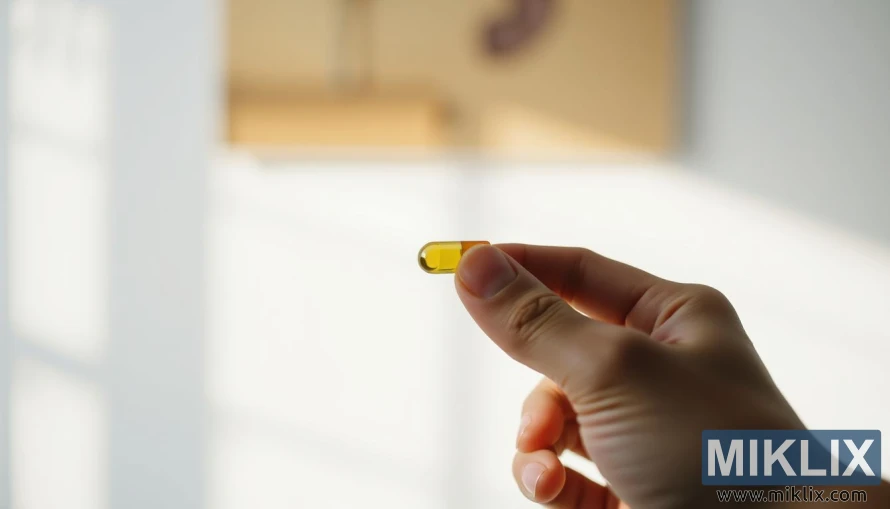Taurine Turbocharge: Natural Support for Metabolism, Mood and Immunity
Published: June 23, 2025 at 2:28:31 PM UTC
Taurine supplements have gained significant attention for their health benefits. This compound is naturally present in our bodies and plays a key role in many physiological processes. Studies indicate that taurine can help maintain and improve overall health. It's a favorite among those looking to boost their well-being. This article will dive into the benefits of taurine, including its impact on exercise, heart health, and more.

Key Takeaways
- Taurine supplements may support cardiovascular health.
- They can enhance exercise performance and recovery.
- Taurine is vital for various physiological functions in the body.
- The supplements are becoming popular in the health and fitness community.
- Research highlights multiple health advantages of taurine usage.
Introduction to Taurine Supplements
The popularity of taurine supplements has grown, thanks to their link to energy drinks. It's found in Red Bull and other beverages, transforming from a simple ingredient to a sought-after supplement. As people focus more on health and wellness, they're looking into taurine as a way to improve their daily lives.
Our look into taurine supplements shows it's more than just a boost for energy. It supports heart health and brain function, among other roles. Research continues to uncover its wide-ranging benefits, showing how taurine can offer more than just a quick energy lift.
What is Taurine?
Taurine is a semi-essential amino acid that is vital for many bodily functions. It is synthesized by the body, yet its importance makes it semi-essential. This amino acid is found mainly in the brain, heart, and muscles.
It plays a key role in several critical functions. These include nerve growth and development, maintaining cell hydration, and producing bile salts. Bile salts are essential for efficient digestion.
Knowing what taurine is helps us understand its role in health. Even though the body makes it, dietary sources or supplements can boost levels. This is important for those with high physical demands or certain dietary needs.
How Taurine is Produced in the Body
The human body has a remarkable ability to produce taurine, mainly in the liver. This process starts with cysteine and methionine, the amino acids that form the basis for taurine synthesis.
Cysteine undergoes several transformations, including oxidation and sulfur incorporation, to become taurine. Methionine also plays a role, boosting the body's ability to produce taurine under normal conditions.
Even though the body can naturally synthesize taurine, several factors can affect its production. Stress and certain illnesses can reduce the body's ability to synthesize taurine. This results in lower levels of this vital amino acid. It's essential to maintain a healthy lifestyle and manage stress to ensure optimal taurine levels.
Dietary Sources of Taurine
Taurine, an essential amino acid, is found mainly in animal products. The key sources include:
- Meat, such as beef and lamb
- Poultry, like chicken and turkey
- Seafood, including fish and shellfish
- Dairy products, like milk, cheese, and yogurt
These foods are rich in taurine, essential for the body's needs. They are critical for those who cannot produce enough taurine naturally.
Vegetarians and vegans face challenges in getting taurine from their diet. Plant-based foods have little to no taurine. This can lead to health issues. For those avoiding animal products, supplements might be necessary to meet taurine needs.
Health Benefits of Taurine
Taurine is packed with health benefits that boost overall wellness. It plays a key role in keeping cells hydrated. This is essential for the body's optimal functioning, as taurine regulates water uptake in all tissues.
Another vital function of taurine is managing electrolytes. These substances are critical for nerve function and muscle contraction. With enough taurine, the body maintains a balance of electrolytes, supporting heart health.
Taurine also benefits vision. Studies show it can protect against retinal degeneration, making it important for eye health. Its antioxidant properties help protect cells from oxidative stress, promoting overall cellular health.
It aids in metabolism by breaking down fats and improving insulin sensitivity. This makes taurine beneficial for those looking to manage their weight or improve metabolic health.
Lastly, taurine acts as a powerful antioxidant. It fights off harmful free radicals, helping the body prevent oxidative damage. This damage is linked to many chronic diseases.
Known Health Benefits of Taurine
Taurine, a naturally occurring amino acid, provides several health benefits. It helps maintain proper hydration levels, vital for bodily functions and cellular activity. Adequate hydration is key for optimal performance in physical and mental activities.
It also supports liver function effectively. Taurine plays a critical role in detoxification, aiding the liver in removing harmful substances. This leads to better metabolism and nutrient absorption.
Another key benefit is its ability to regulate calcium levels within cells. This is essential for muscle contraction and neurotransmitter release. It supports both physical activity and mental health.
Research shows taurine can also boost immune health. It enhances the body's defense mechanisms, allowing for more effective responses to infections and illnesses.
Potential Health Benefits of Taurine
The study of taurine's benefits is a topic of great interest. Researchers and health enthusiasts are eager to learn more. Early findings suggest taurine could improve various health areas. Yet, more research is needed to confirm these possibilities.
Several areas are being explored:
- Heart function enhancement, with implications for heart health.
- Diabetes management, focusing on blood sugar control.
- Enhanced exercise performance, leading to better stamina and less fatigue.
Scientists are diving deeper into these benefits. Taurine research is expected to reveal more about its role in health. Further studies will shed light on its disease prevention and health improvement capabilities.
Exercise and Taurine
Taurine is a key player in boosting athletic performance, making it a favorite among athletes and fitness buffs. Studies show a strong connection between taurine and exercise performance. They suggest that taurine can enhance stamina and cut down muscle fatigue during intense workouts.
Adding taurine to a workout routine brings many benefits. One major advantage is faster muscle recovery after exercise. This allows athletes to push their limits and train more often. Research indicates that higher taurine levels can improve exercise capacity and overall performance.
Some notable effects of taurine on exercise include:
- Improved endurance and stamina during prolonged activities.
- Reduced muscular fatigue, enabling longer workout sessions.
- Enhanced recovery, promoting quicker return to training after intense exercise.
These findings underscore taurine's role in better performance and recovery. It's a valuable supplement for those in high-intensity workouts. As athletes seek to improve their performance, taurine stands out as a key player in sports nutrition.
Taurine and Aging
Research indicates that taurine levels decrease with age, sparking interest in its role in aging. Studies suggest a link between taurine and declining physiological functions with age. This decline could impact metabolic health and overall vitality.
Animal studies reveal a connection between taurine supplementation and improved health markers. This suggests a possible link between taurine and longevity. The findings hint at taurine's role in promoting healthy aging.
Keeping taurine levels up may support vital functions during aging. As we learn more about taurine and aging, it could lead to new ways to enhance longevity and quality of life.
How Taurine Supplements Work
Taurine supplementation mechanism involves several physiological processes that contribute to health. When consumed, taurine interacts with cellular structures, promoting hydration and stability. This amino acid plays a vital role in maintaining electrolyte balance, which aids in cellular hydration. This, in turn, enhances overall cellular function.
Further, taurine acts as a powerful antioxidant. By scavenging free radicals, it helps protect cells from oxidative stress. This potentially reduces the risk of chronic diseases. Understanding how taurine works within the body provides insight into its many health benefits. These include improved exercise performance and greater cardiovascular health.
Side Effects of Taurine Supplements
Taurine supplements are often praised for their various health benefits. Yet, it's vital to understand the possible side effects of taurine. Taking too much taurine can cause several adverse reactions. These effects can vary from person to person.
Some common side effects of taurine include:
- Nausea
- Headaches
- Liver discomfort
- Gastrointestinal issues
Those considering taurine supplements should be cautious. It's important to use them in moderation to ensure safety. Before starting any new supplement, it's wise to consult with a healthcare provider. This is even more critical for individuals with pre-existing medical conditions or those on medications that could interact with taurine.
Medication Interactions with Taurine
Taurine is a widely used supplement known for its health benefits. It's vital to grasp the interactions between taurine and medications, mainly for those on certain drugs. This awareness is key to safe use and avoiding risks tied to taurine and drug interactions.
Those on blood thinners and certain antidepressants should be cautious with taurine. Its influence on metabolic processes can change how these drugs work or their side effects. It's essential for individuals on these medications to consult with a healthcare provider. They can discuss how taurine might impact their treatment plan.
Some common medications that may interact with taurine include:
- Blood thinners such as warfarin.
- Antidepressants, mainly those affecting serotonin levels.
- Diabetes medications, as taurine could affect insulin sensitivity.
Always consult a professional before starting taurine to ensure it's safe with your current treatments. This step is vital for protecting your health and well-being.

Considerations Before Taking Taurine Supplements
Before starting taurine supplements, it's important to consider several factors. Assess your dietary intake of taurine-rich foods like meat and fish. If you already consume enough taurine, supplements might not be necessary.
Your health status is also a key factor. If you have certain medical conditions or are on specific medications, consult a healthcare professional. They can provide personalized advice on taurine supplements. It's vital to weigh the benefits against the risks.
Quality assurance is another critical aspect. Opt for taurine supplements that have been third-party tested. This ensures the product's purity and helps build trust in the quality of what you're consuming.
In conclusion, carefully evaluating your diet, health, and the quality of supplements is essential. Seeking professional advice can help you make informed decisions about your taurine needs. This approach maximizes the benefits while minimizing risks.
Taurine in Energy Drinks and Supplements
Taurine is a key component in many energy drinks, known for boosting energy and physical performance. It's a favorite among athletes and fitness enthusiasts for its energizing effects. Taurine in sports supplements is also valued for its role in recovery and reducing fatigue, appealing to those who push their limits.
There's a common myth about taurine's origins. Many think it comes from animals, which worries those on plant-based diets. Yet, most taurine in energy drinks and supplements is made synthetically. This synthetic version offers the same benefits without the ethical issues tied to animal products.
Taurine is everywhere in energy products, from well-known brands to specialized ones. Its widespread use in energy drinks and sports supplements helps us make better choices about what we put in our bodies and how we perform athletically.
Are Taurine Supplements Necessary?
The need for taurine supplements varies among individuals and certain groups. Most people get enough taurine from their diet and natural production. Omnivores usually get enough from meat, fish, and dairy.
Vegetarians and vegans, on the other hand, might need supplements due to their diet's lack of animal products. Those with health issues may also require more taurine because their bodies can't make enough.
As research grows, understanding when taurine supplements are needed becomes more important. They can help with hormone balance, brain health, and muscle function. It's key to watch your diet and health to see if supplements are helpful.

Alternative Ways to Increase Taurine Levels
To boost taurine levels naturally, consider several dietary and lifestyle changes. High-protein foods are key. Chicken, turkey, fish, and dairy are rich in taurine. For plant-based diets, seaweed is a good source of taurine and other nutrients.
Exercise is also vital for taurine levels. Physical activity increases protein metabolism, leading to more taurine production. A balanced diet and regular exercise together help maintain taurine levels.
- Incorporate high-protein foods into your meals.
- Choose fish and poultry as primary protein sources.
- Consider including dairy products if you're not lactose intolerant.
- Engage in regular exercise to boost taurine synthesis.
- Explore plant-based options like seaweed for taurine intake.
Conclusion
The benefits of taurine supplements are extensive, showing promise for improving health and well-being. They are known to enhance cardiovascular health and support exercise performance. Yet, ongoing research and caution are necessary when considering supplementation.
Reflecting on taurine, it's clear that a balanced diet is key to health. While supplements can offer additional support, they should not replace a diet full of natural taurine sources. It's vital for individuals, and those with health concerns or dietary restrictions, to seek professional advice before adding taurine to their regimen.
Taurine may provide a significant advantage to certain groups when used correctly. As studies continue, a clearer understanding of its role in health will emerge. Tailoring supplementation to individual needs is essential for maximizing benefits while avoiding risks.
Further Reading
If you enjoyed this post, you may also like these suggestions:
- Colostrum Supplements Explained: Enhancing Gut Health, Immunity, and Vitality
- The Power of Plums: Sweet Fruit, Serious Health Perks
- MSM Supplements: The Unsung Hero of Joint Health, Skin Glow, and More
